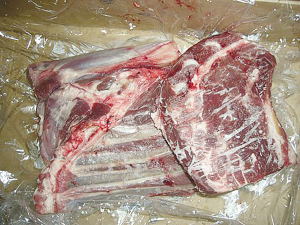New export records for Aussie goatmeat
The Australian goatmeat industry set a new record for production and exports last year.
 Goat meat: There are specific markets for different sized goats with traditional ethnic preferences, especially festival, needs for small goats.
Goat meat: There are specific markets for different sized goats with traditional ethnic preferences, especially festival, needs for small goats.
Why have processor/exporters not encouraged more goat meat when it sells at comparable retail prices to lamb in USA?
This was me first question in my last article. Read 'What about the potential of goat meat exports?' here.
Goats have negatives for the processors. They are not easily handled in the yards to separate lines. Plant operations are affected by different sized animals in a line that slows chain speed and supplied numbers may not match bookings.
With a total NZ goat kill about 120 000 head, spread over several plants, the relatively small numbers do not produce enough by-products to market at profitable prices. So, these end up as pet food, even while there is a premium – such as $US6 per lb for kidney and liver. Goat skins have the same problem – with low interest from buyers in relatively small numbers of variable sizes and qualities.
There are specific markets for different sized goats with traditional ethnic preferences, and especially festival, needs for often small goats. Yet a specific processing issue is small kids are expensive to slaughter with no sale products other than meat.
However, in the US live auction market of 21- 25- 28 kg LW kids there was a 2.5-5% value discount at each step as weight increased. While at 38kg LW or 17 kg CW, kids were discounted by over 15% indicating that market premium for light animals could help to counter higher processing costs.
Traditionally, some processors have successfully used goat slaughter as a plant management strategy to occupy staff and spread overheads during down times with other stock. Fabrication is simple and cheap; with either whole carcases or six-way cuts – no costs for added value, frozen storage and no trade restrictions.
Outside of supplies to a couple of traditional markets, meat is often spot traded – influenced by storage space priority, product competition, supplies, exchange rates and other marketing dynamics. Delivery can be simple by including goat with other frozen meat products.
However, such a processing regime prioritises other stock; so limited goat slaughter times can disadvantage goat farmers. Changing any of this – to access and develop one of more market segments for higher prices – needs farmers to commit to and address processing problems and supply specified numbers of standardised sized stock in identified lines.
These issues can be solved with better co-ordination and cooperation. Higher market returns would encourage more slaughter numbers to slowly overcome by-product and skin limitations and enhance returns.
About the author
Garrick Batten has a long professional and practical career in the goat sector. He has farmed goats for 30 years and written several goat books. His latest book is: ‘Big Buck$ for Pastoral Farmers’. It is especially for livestock farmers new to commercial goat farming. It is available from: https://www.copypress.co.nz/real-nz-books
The World Wide Sires National All Day Breeds Best Youth Camp Best All Rounder plaudit has become family affair, with 2026 Paramount Cup winner Holly Williams following in her sister Zara's footsteps.
DairyNZ is giving New Zealand farmers a unique opportunity to gain hands-on governance and leadership experience within the dairy sector.
Herd improvement company LIC has posted a 5.2% lift in half-year revenue, thanks to increasing demand for genetics.
According to the latest Fresh Produce Trend Report from United Fresh, 2026 will be a year where fruit and vegetables are shaped by cost pressures, rapid digital adoption, and a renewed focus on wellbeing at home.
The Roar is a highlight of the game hunting calendar in New Zealand, with thousands of hunters set to head for the hills to hunt male stags during March and April.
OPINION: The past few weeks have been tough on farms across the North Island: floods and storms have caused damage and disruption to families and businesses.

OPINION: Meanwhile, red blooded Northland politician Matua Shane Jones has provided one of the most telling quotes of the year…
OPINION: This old mutt has been around for a few years now and it seems these ‘once in 100-year’ weather…